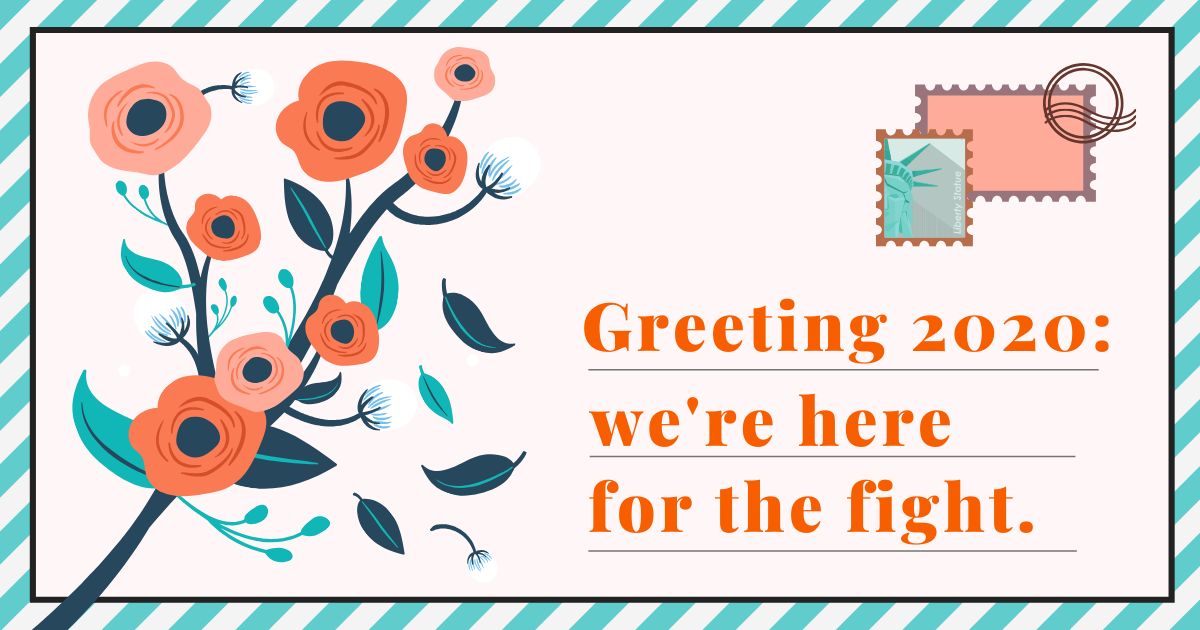
The Way to Greet 2020
 I had intended to write some kind of summary of what we faced in 2019, but the look backward didn’t have much appeal. If you’re reading this, you care about issues of poverty and injustice, and you know that the Trump Administration has sought to make things tougher for poor people in repeated attacks.
I had intended to write some kind of summary of what we faced in 2019, but the look backward didn’t have much appeal. If you’re reading this, you care about issues of poverty and injustice, and you know that the Trump Administration has sought to make things tougher for poor people in repeated attacks.
It isn’t going to get easier in 2020. Just before Christmas, the Department of Agriculture gave final approval to a rule that will deny SNAP to poor individuals without dependents after only three months of assistance if they cannot work a steady 20 hours per week. Many of the Trump rules you opposed through public comments were slowed, but over the next months the Administration is likely to finalize one after another. We must then look to the courts and to Congress to block as much of the damage as possible. And there will be more proposals to cut funding from important programs or to dismantle services by administrative actions.
I’m not an attorney, so I can’t help directly with lawsuits against the SNAP, Medicaid, anti-immigrant and other damaging policies. But people like me can work through organizations to file friend of the court briefs with expert testimony demonstrating the harm these policies would cause. We can and must continue our opposition to proposed regulations and budget cuts, taking our case to Congress, enlisting the help of state leaders and advocates nationwide. And we must keep up the fight to get some of the improvements that low-income people need in 2020. We came so close to expanding the Earned Income Tax Credit and Child Tax Credit in the end-of-year legislative package. We’re not going to stop pressing for the help that low-income people need.
How to greet 2020? With a commitment to keep working, keep fighting. With every harmful proposal, we must show people across the country how people and communities will be affected and add to the numbers of people speaking out in opposition. With every denial of aid actually taking effect, we must show the human consequences and seek a reversal. We have to use every means of communication and public education available. All of us have a role to play – marching, tweeting, contacting Congress, asking candidates their positions at forums, educating others – it’s all necessary.
This new year is the 100th anniversary of the enactment of the 19th amendment, granting the right to vote for women in the U.S. It’s sobering to remember how long the quest for woman’s suffrage took – how many lecture tours, marches, jailings, and vigils, how much organizing and writing. The courage, patience, hard work, and willingness to persist despite long odds is almost unimaginable. Alice Paul, a key organizer of women’s suffragists, said “The President can pardon us again… and again and again, but… picketing will continue, and sooner or later, he will have to do something about it.” Paul, born in 1885, was taken to women’s suffrage meetings by her mother. She helped to organize 18 months of picketing the White House by more than one thousand “Silent Sentinels” – women who endured taunts, attacks, and arrests. Paul was sentenced to 7 months in jail and began a hunger strike. President Wilson, who at first opposed giving women the vote, changed his mind in 1918, followed by enactment of the amendment in Congress and ratification by 36 states. All that came only after decades upon decades of struggle. If Alice Paul and the suffragists could persist, so must we.
We’ve just learned that the civil rights hero Representative John Lewis (D-GA) has been diagnosed with cancer. As we wish with all our hearts for his recovery, we must also remember his courage, patience, hard work and willingness to persist despite long odds in the fight for civil rights. If John Lewis can persist, along with many thousands of compatriots, so must we.
These fights are not over. We’ve heard that the arc of the moral universe bends toward justice, but it’s worth looking at the original passage from Theodore Parker, an abolitionist and pastor in the mid-1800s:
“I do not pretend to understand the moral universe; the arc is a long one, my eye reaches but little ways; I cannot calculate the curve and complete the figure by the experience of sight; I can divine it by conscience. And from what I see I am sure it bends towards justice.”
From here, the arc looks dauntingly bumpy, and as with Rev. Parker, our understanding of it is uncertain. But it is the actions we take, impelled by conscience, that push the arc in the right direction.
So: greetings, 2020: we’re here for the fight.

